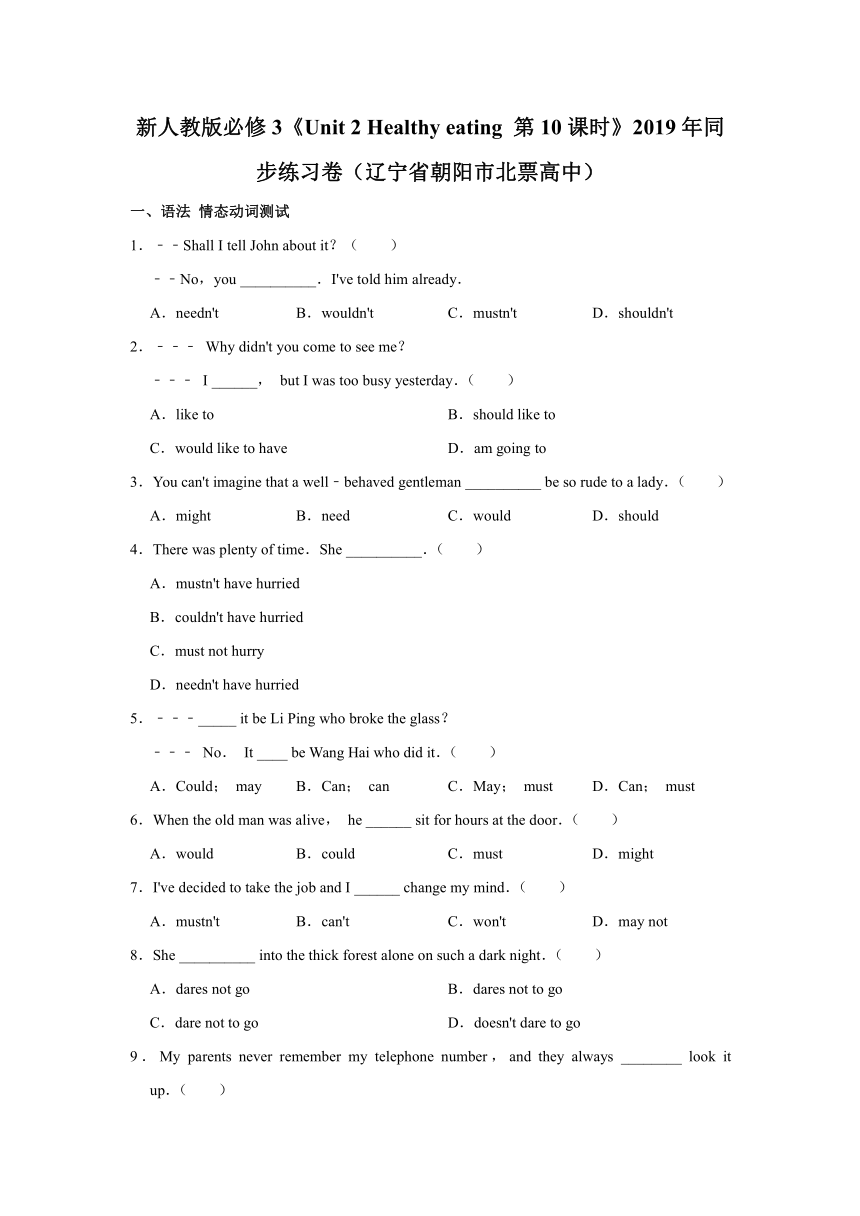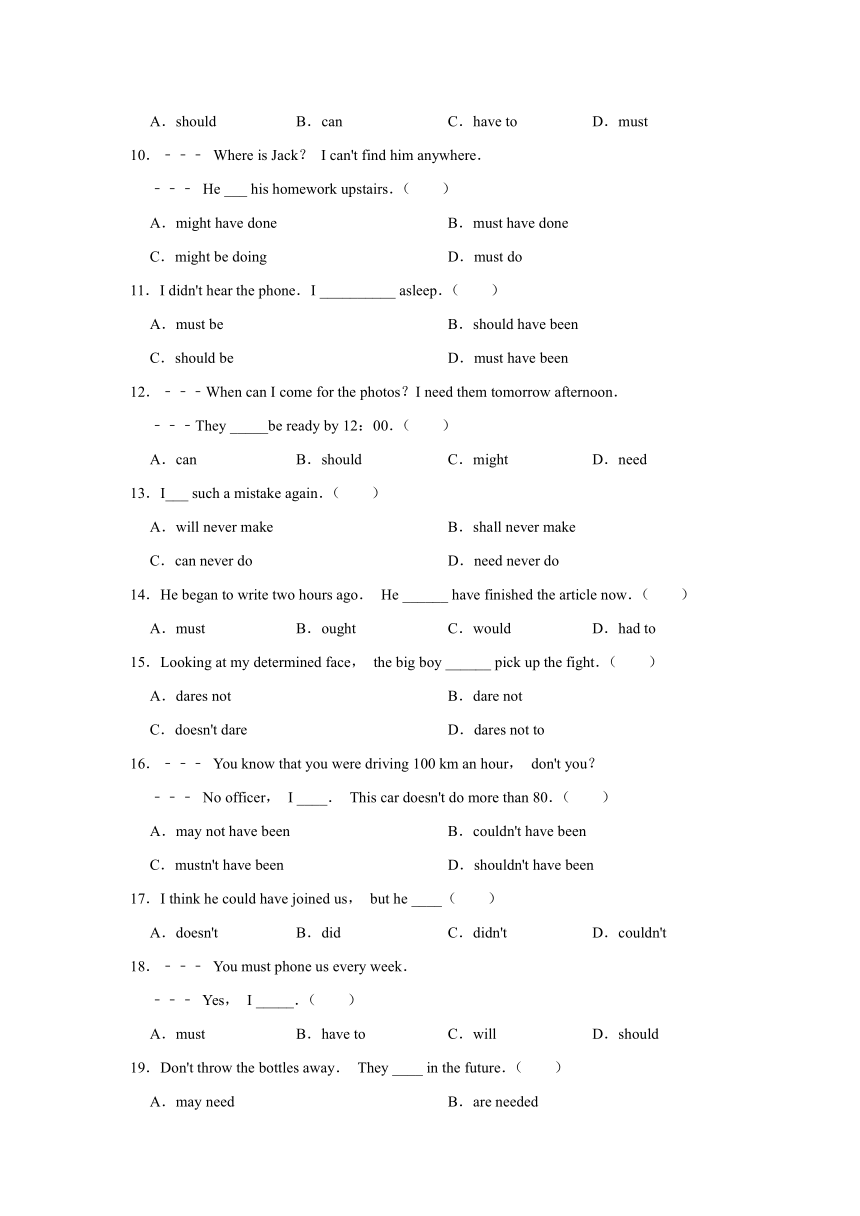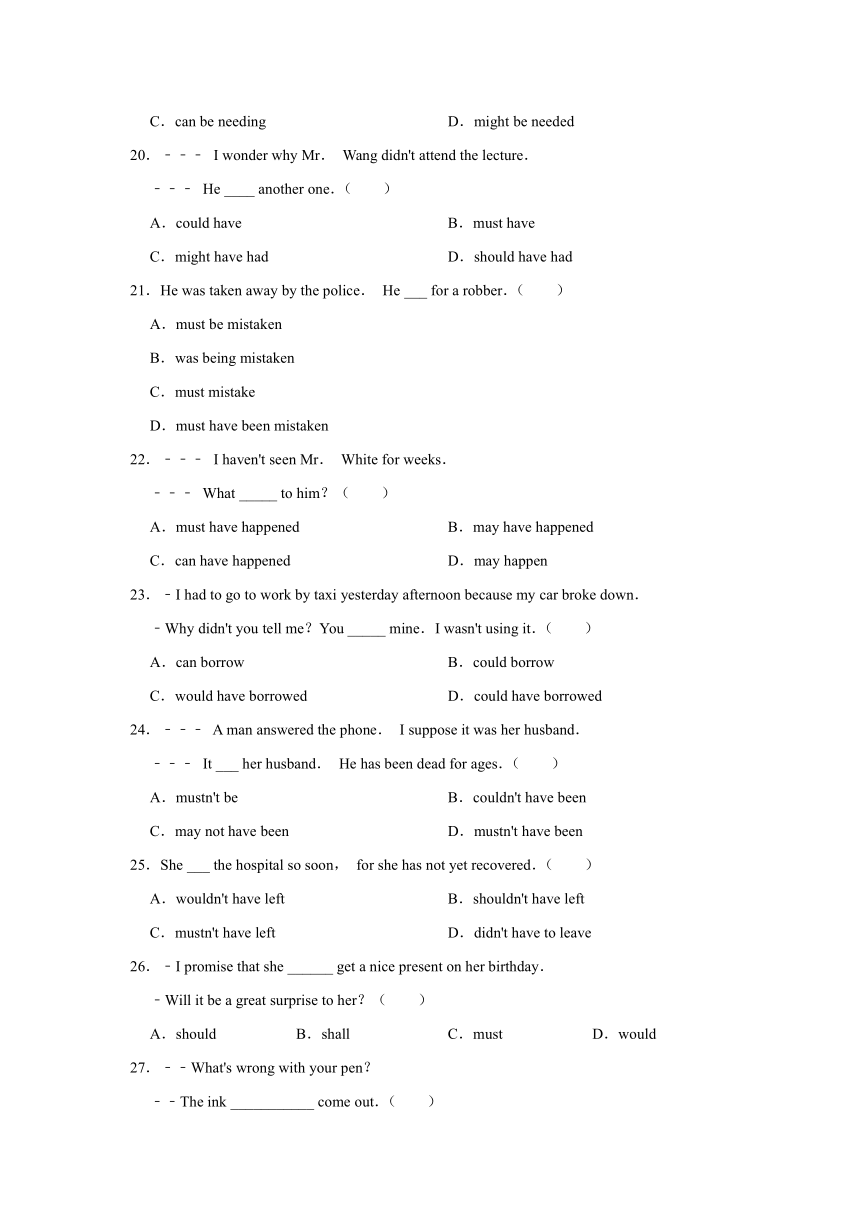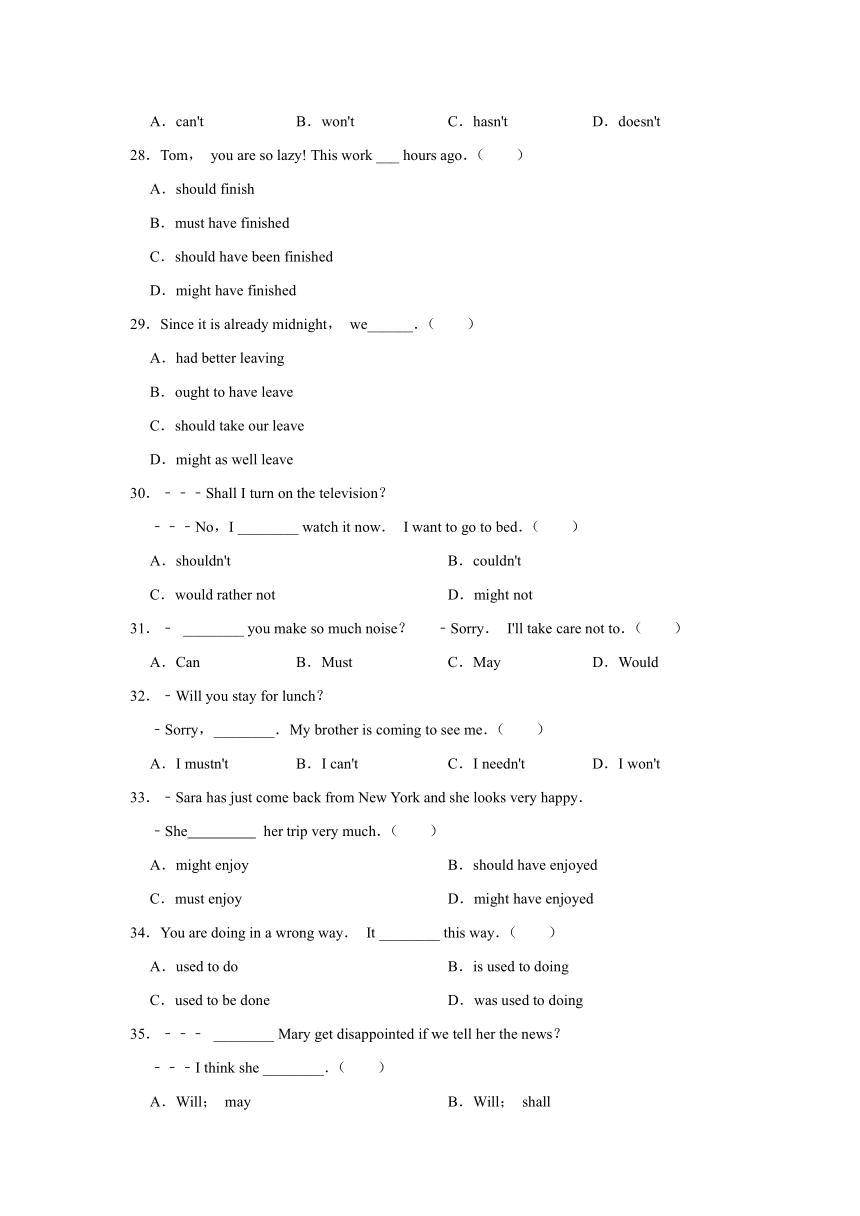新人教版必修3 Unit 2 Healthy eating情态动词练习
文档属性
| 名称 | 新人教版必修3 Unit 2 Healthy eating情态动词练习 |

|
|
| 格式 | zip | ||
| 文件大小 | 17.2KB | ||
| 资源类型 | 教案 | ||
| 版本资源 | 人教版(新课程标准) | ||
| 科目 | 英语 | ||
| 更新时间 | 2019-05-26 08:02:31 | ||
图片预览





文档简介
新人教版必修3《Unit 2 Healthy eating 第10课时》2019年同步练习卷(辽宁省朝阳市北票高中)
一、语法 情态动词测试
1.﹣﹣Shall I tell John about it?( )
﹣﹣No,you __________.I've told him already.
A.needn't B.wouldn't C.mustn't D.shouldn't
2.﹣﹣﹣ Why didn't you come to see me?
﹣﹣﹣ I ______, but I was too busy yesterday.( )
A.like to B.should like to
C.would like to have D.am going to
3.You can't imagine that a well﹣behaved gentleman __________ be so rude to a lady.( )
A.might B.need C.would D.should
4.There was plenty of time.She __________.( )
A.mustn't have hurried
B.couldn't have hurried
C.must not hurry
D.needn't have hurried
5.﹣﹣﹣_____ it be Li Ping who broke the glass?
﹣﹣﹣ No. It ____ be Wang Hai who did it.( )
A.Could; may B.Can; can C.May; must D.Can; must
6.When the old man was alive, he ______ sit for hours at the door.( )
A.would B.could C.must D.might
7.I've decided to take the job and I ______ change my mind.( )
A.mustn't B.can't C.won't D.may not
8.She __________ into the thick forest alone on such a dark night.( )
A.dares not go B.dares not to go
C.dare not to go D.doesn't dare to go
9.My parents never remember my telephone number,and they always ________ look it up.( )
A.should B.can C.have to D.must
10.﹣﹣﹣ Where is Jack? I can't find him anywhere.
﹣﹣﹣ He ___ his homework upstairs.( )
A.might have done B.must have done
C.might be doing D.must do
11.I didn't hear the phone.I __________ asleep.( )
A.must be B.should have been
C.should be D.must have been
12.﹣﹣﹣When can I come for the photos?I need them tomorrow afternoon.
﹣﹣﹣They _____be ready by 12:00.( )
A.can B.should C.might D.need
13.I___ such a mistake again.( )
A.will never make B.shall never make
C.can never do D.need never do
14.He began to write two hours ago. He ______ have finished the article now.( )
A.must B.ought C.would D.had to
15.Looking at my determined face, the big boy ______ pick up the fight.( )
A.dares not B.dare not
C.doesn't dare D.dares not to
16.﹣﹣﹣ You know that you were driving 100 km an hour, don't you?
﹣﹣﹣ No officer, I ____. This car doesn't do more than 80.( )
A.may not have been B.couldn't have been
C.mustn't have been D.shouldn't have been
17.I think he could have joined us, but he ____( )
A.doesn't B.did C.didn't D.couldn't
18.﹣﹣﹣ You must phone us every week.
﹣﹣﹣ Yes, I _____.( )
A.must B.have to C.will D.should
19.Don't throw the bottles away. They ____ in the future.( )
A.may need B.are needed
C.can be needing D.might be needed
20.﹣﹣﹣ I wonder why Mr. Wang didn't attend the lecture.
﹣﹣﹣ He ____ another one.( )
A.could have B.must have
C.might have had D.should have had
21.He was taken away by the police. He ___ for a robber.( )
A.must be mistaken
B.was being mistaken
C.must mistake
D.must have been mistaken
22.﹣﹣﹣ I haven't seen Mr. White for weeks.
﹣﹣﹣ What _____ to him?( )
A.must have happened B.may have happened
C.can have happened D.may happen
23.﹣I had to go to work by taxi yesterday afternoon because my car broke down.
﹣Why didn't you tell me?You _____ mine.I wasn't using it.( )
A.can borrow B.could borrow
C.would have borrowed D.could have borrowed
24.﹣﹣﹣ A man answered the phone. I suppose it was her husband.
﹣﹣﹣ It ___ her husband. He has been dead for ages.( )
A.mustn't be B.couldn't have been
C.may not have been D.mustn't have been
25.She ___ the hospital so soon, for she has not yet recovered.( )
A.wouldn't have left B.shouldn't have left
C.mustn't have left D.didn't have to leave
26.﹣I promise that she ______ get a nice present on her birthday.
﹣Will it be a great surprise to her?( )
A.should B.shall C.must D.would
27.﹣﹣What's wrong with your pen?
﹣﹣The ink ___________ come out.( )
A.can't B.won't C.hasn't D.doesn't
28.Tom, you are so lazy! This work ___ hours ago.( )
A.should finish
B.must have finished
C.should have been finished
D.might have finished
29.Since it is already midnight, we______.( )
A.had better leaving
B.ought to have leave
C.should take our leave
D.might as well leave
30.﹣﹣﹣Shall I turn on the television?
﹣﹣﹣No,I ________ watch it now. I want to go to bed.( )
A.shouldn't B.couldn't
C.would rather not D.might not
31.﹣ ________ you make so much noise? ﹣Sorry. I'll take care not to.( )
A.Can B.Must C.May D.Would
32.﹣Will you stay for lunch?
﹣Sorry,________.My brother is coming to see me.( )
A.I mustn't B.I can't C.I needn't D.I won't
33.﹣Sara has just come back from New York and she looks very happy.
﹣She her trip very much.( )
A.might enjoy B.should have enjoyed
C.must enjoy D.might have enjoyed
34.You are doing in a wrong way. It ________ this way.( )
A.used to do B.is used to doing
C.used to be done D.was used to doing
35.﹣﹣﹣ ________ Mary get disappointed if we tell her the news?
﹣﹣﹣I think she ________.( )
A.Will; may B.Will; shall
C.Shall; will D.Shall; need
36.He _____ his parents about his failure in the exam.( )
A.dares not tell B.dares not telling
C.dare not tell D.dares not to tell
37.﹣Could I use your phone?
﹣Yes, of course you ______.( )
A.can B.will C.must D.should
38.I want to go to the chemist's, but you go with me.( )
A.need not B.must not C.need D.must
39.﹣﹣﹣Must we finish the composition in class?
﹣﹣﹣No, you .( )
A.needn't B.mustn't C.won't D.shouldn't
40.﹣﹣﹣ _____ he start at once or wait for a while?
﹣﹣﹣ Let him start at once.( )
A.Will B.Would C.Does D.Shall
41.﹣﹣﹣Excuse me.Is this the right way to the Summer Palace?
﹣﹣﹣Sorry,I am not sure.But it ______ be.( )
A.can B.will C.must D.might
42.﹣﹣﹣I don't mind telling you what I know.
﹣﹣﹣You______.I'm not asking you for it.( )
A.mustn't B.may not C.can't D.needn't
43.﹣﹣Is that Mary over there?
﹣﹣No,it______ be her.I'm sure she doesn't wear glasses.( )
A.can't B.must not C.won't D.may not
44.You_____ be tired﹣﹣﹣you've only been working for an hour.( )
A.must not B.won't C.may not D.can't
45.Tom ought not to________me your secrets,but he meant no harm.( )
A.have told B.tell
C.be telling D.having told
46.there was a lot of fun at yesterday's party.You ____ have come,but why didn't you?( )
A.must B.shouldn't C.needn't D.ought to
47.﹣I heard they went skiing in the mountains last winter.
﹣It ______ true because there was little snow there.( )
A.may not be B.won't be
C.couldn't be D.will be
新人教版必修3《Unit 2 Healthy eating 第10课时》2019年同步练习卷(辽宁省朝阳市北票高中)
参考答案与试题解析
一、语法 情态动词测试
1.【解答】答案:A.
根据后面的句子I've told him already可知,再告诉他已经没有意义了,所以用needn't;故选A.wouldn't表示过去不会做,mustn't千万不能;shouldn't不应该.
2.【解答】答案: C.考查情态动词.句意:﹣﹣﹣你昨天为啥没来?﹣﹣﹣我本来打算来的,但来我太忙了.would love to have done想做但未做.
故选:C.
3.【解答】根据前面的You can't imagine可知答案为D项,should有"竟然"的意思,表示一种惊讶的语气.其它三项不符合语境.might可能;need需要;would会;就.
故选:D.
4.【解答】答案是D.本题考查"情态动词+have done"的结构.对过去的或已经发生的事件的说明往往用"情态动词+have done"的结构,由句中的was可知事件已经发生,所以用"情态动词+have done"的结构,排除C.没有mustn't have done;couldn't have done表示"不可能已经……";needn't have done是虚拟语气,表示"本不必做而实际上却做了";根据句意,她"本不必匆忙"推断,答案选择D.
5.【解答】本题考查情态动词.根据句意可知第一句话是疑问句,表示推测用can,第二空表示肯定推测用must.
故选:D.
6.【解答】答案:A.考查情态动词.句意:当老人还活着的时候,他会在门口坐上几个小时.would也表示过去经常,习惯性做法;could能够; must必须,一定; might有可能.所以A选项符合句意.
故选:A.
7.【解答】答案:C.考查情态动词.句意:我决定接受这份工作,我不会改变主意的.A 禁止;B 不能够;C 不想,不乐意;D 有可能不,所以C选项符合句意.
故选:C.
8.【解答】答案是D.本题考查否定句. 题干中dare可以为情态动词时,没有人称和数的变化,后接动词原形,否定式:dare not do; dare也可以为实意动词时,有人称和数的变化,其否定形式为doesn't /don't dare to do ,在肯定句中后面常接带to的不定式,在否定句或疑问句中不定式中的to可带也可不带.A和B项中dares有人称的变化属于实意动词,但是后面直接接了否定词not,错误;C项中dare后面直接接not应该属于情态动词,但是后面不能接动词不定式,故C错误;D项中dare为实意动词,故答案是D.
9.【解答】答案:C 本题考查情态动词must 与动词短语have to的区别.首先根据句意排除AB两项.must(必须、必要)表示说话人的主观看法;短语hve to(必须、不得不)强调客观需要.结合上文My parents never remember my telephone number可知,他们查号码是客观上"不得不",并非主观意愿.
故选:C.
10.【解答】答案:C.考查情态动词.句意:杰克在哪儿?我哪儿也找不到他.﹣﹣他可能在楼上做作业.A 有可能做完 是对过去的没有把握的推测;B 一定做了某事,是对于过去的有把握的推测;C might be doing 表示可能正在做某事;D 一定做,对于现在的可定推测.所以C选项符合句意.
故选:C.
11.【解答】答案:D
解析:A:一定是(睡着了);B:本应该做某事而实际未做;C:应该是;D:(过去)一定是做过某事."入睡"发生在"听电话"之前,故后面的句子该使用完成时,因此A、C选项直接排除.根据前面的"我没听到电话"可知我"一定是已经睡着了",故本题答案为D选项.
12.【解答】答案:B.can能够;should应该;might可能;need需要,根据上下文语境可知这是说话人根据经验主观推测的可能性.用should.故选B.
13.【解答】答案:A 根据句子含义,说话者表达承诺或决心.表示承诺或决心时,will用于第一人称,shall用于第二三人称.所以A项符合语境.
故选:A.
14.【解答】答案:A 结合前一句He began to write two hours ago信息,说话人推测他已经写完了这篇文章.表示对过去情况肯定的推测,用must have done.选项B应该用ought to 表示本来应该做却未做;选项Cwould have done通常用于虚拟条件句中;D项没有这种结构.所以只有A项符合语境.
故选:A.
15.【解答】答案:B 本题考查dare.dare作为情态动词来使用,没有人称和数的变化,后接动词原形,否定形式为dare not do;dare作实义动词时,有人称和数以及时态的变化,后面常接动词不定式,否定形式为doesn't dare to do.结合以上说明,只有B项表达正确.
故选:B.
16.【解答】答案:B. 考查情态动词. 根据This car doesn't do more than 80可知,开车者认为自己(不可能)每小时开100公里.表示对过去情况有把握的推测,通常用couldn't have done;A项也表示对过去情况的推测但把握性不大;C项must只用于肯定句;D项则表示本来不应该做但是却做了.结合语境,只有B项符合.
故选:B.
17.【解答】答案 :C could have done表示(过去)本来能够做某事,但实际上却没有做(but he didn't).所以根据第一句he could have joined us给出的信息可知,他并没有加入我们.根据前后时态一致原则,C项符合语境.
故选:C.
18.【解答】答案:C 第一句对方向你提出要求You must phone us every week,你若答应,就回答I will.will用于第一人称,表示允诺或答应.
故选:C.
19.【解答】答案:D 首先通过句意可知,bottles和need之间表达被动关系,故排除AC两项.结合 时间状语in the future(在将来),排除B项.D项表示可能性,可用于对将来情况作出推测.
故选:D.
20.【解答】答案:C 通过第一句可知, Mr. Wang didn't attend the lecture这个事情发生在过去,因此答语中对过去发生的情况作了推测.C项might have had表示对过去情况的推测,但把握性并不大.D项should have done本来应该做却未做,表达对过去动作的责备、批评.AB两项都表示对现在情况的推测.只有C项符合语境.
故选:C.
21.【解答】答案:D.考查情态动词. 结合第一句He was taken away by the police可知,动作已经发生,因此"他被误认成抢劫犯"应该是指过去被误认为.D项must have been mistaken表达对过去情况肯定的推测.
故选:D.
22.【解答】答案:C 表示对已发生的情况进行推测,must 只能用于肯定句,不用于否定和疑问句;may通常用于肯定句和否定句;can常用于否定和疑问句.本题干为疑问句,所以只有C项符合语境.
故选:C.
23.【解答】答案:D
句意表达的是与过去事实相反的假设,要用虚拟;对过去的相反假设,要用情态动词加现在完成时态来构成;could表示本可以,would表示本来会.故选D.
24.【解答】答案:B 通过对话可知,说话者根据 He has been dead for ages对是她丈夫的可能性做出否定的推测,选项Bcouldn't have been(不可能是),对过去情况否定的推测,把握性比较大;C项也表示对过去情况否定的推测,但把握性不大;AD两项must只用于肯定的推测.所以只有B项符合语境.
故选:B.
25.【解答】答案:B 根据句子含义可知,说话者对她还没有康复就离开医院表示责备、批评.表达对过去动作的责备、批评,选项B中shouldn't have done(本来不应该做却做了).选项C表示对过去情况肯定的推测用must have done,否定的推测则用can't have done;wouldn't have done表示对过去情况的推测,但通常用于虚拟条件句中.所以只有B项符合语境.
故选:B.
26.【解答】答案是B.本题考查情态动词shall的用法.情态动词shall常常用在二、三人称的陈述句中表示命令、警告、允诺等.根据promise(承诺)和句意可知,"我承诺给她生日礼物",所以本题答案选择B.
27.【解答】答案:B
考查情态动词.will用于非人称主语时,表示物体的固有性质和倾向,这是一种固定用法.比如The window won't open,所以答案选B.
28.【解答】答案:C 根据句子含义可知,说话者对汤姆未能完成工作表示责备、批评.表达对过去动作的责备、批评,英语中通常用should have done(本来应该做却未做).must have done表示对过去情况肯定的推测;might have done表示对过去情况的推测,但把握性不大.所以只有C项符合语境.
故选:C.
29.【解答】答案:D 选项A中,短语had better后接动词原形;选项B中可以说ought to have left(早就应该离开);选项C中take leave有告别、辞别之意,但中间一般不接人称代词;选项Dmight as well 通常用于肯定句中,含义为"还是……为好",表示委婉的提出建议或劝告.所以D项符合语境.
故选:D.
30.【解答】答案:C 在这段对话中,对方向你征求意见,而答语中No明确表示拒绝,理由是 I want to go to bed.C项would rather not(我宁愿不)表明自己的态度,符合前后语境.
故选:C.
31.【解答】考查情态动词.运用排除法,can有能不能的意思,may则更不对,表示"你可以……样吗",would表示请求等.而must语气最重,表示"你非得要制造这么多噪音吗?﹣对不起,我会注意不再这样的."
故选:B.
32.【解答】答案是B.本题考查情态动词辨析;mustn't禁止;can't不能;不可能;needn't不必;won't不会;根据下文"我哥哥要来看我"推断我"不能"留下来吃晚饭,所以答案选择B.
33.【解答】答案:D
解析:Sara现在已经从纽约回来,"看起来很开心"是"享受旅行"带来的"结果或影响",故情态动词后面应该用完成形式;should have done 表按道理应该怎样,而事实上却不是这样;might have done 表过去有可能某样,符合题意.
34.【解答】考查动词短语的含义辨析.used to do…意为"过去常常……";be used to (doing)…意为"习惯于做……";结合句意,it与do之间为被动关系,所以C项正确.
故选:C.
35.【解答】答案:A 第一句中含有条件句,根据条件句中的时态为一般现在时可知,前面主句时态应该用将来时(主将从现).shall用于第一三人称时,通常用来征求意见,故排除CD项.在一般将来时的问句中,用will提问,回答也要用will,但也可以回答may,表示不确定.所以只有A项符合语境.
故选:A.
36.【解答】答案:C.考查dare的用法.当dare为情态动词时,没有单复数,后跟动词原形,即dare (not) do…;当dare为实义动词时,有单复数,后跟(doesn't/didn't/don't)dare to do…综上,所以C项正确.
故选:C.
37.【解答】答案:A.考查情态动词.句意:我可以用一下你的电话吗?﹣是的,当然可以.can"能够";will"乐意";must"必须";should"理应,应该".
故选:A.
38.【解答】答案:A 考查情态动词need与must的用法.need作情态动词使用时,常用于疑问和否定句;情态动词must(必须)用于表达说话人的主观看法,否定形式表示"禁止、不准".结合语境,说话者认为对方"没有必要"跟着去.
故选:A.
39.【解答】答案:A must用于一般疑问句时,它的否定回答通常用needn't或don't have to.结合选项,只有A符合.
故选:A.
40.【解答】考查情态动词与助动词.根据答语可知,第一句是在征求意见.shall用于第一三人称时通常表示征求意见.A项will用于第三人称只表达将来,would则表达过去的将来;C项一般现在时表达现在的习惯性的动作或状态.所以只有D项符合语境.
故选:D.
41.【解答】答案是D.本题考查情态动词辨析;can 能够,可能会(表示客观的可能性,暗示可能性很小);will会;must必须;might也许(没有把握);由上文的not sure判断用might表示不肯定的判断"也许",所以答案选择D.
42.【解答】答案:D
解析:A:禁止;B:可能不;C:不能;不可能;D:没必要.根据句意"你没必要(告诉我),我没有问你要"及所给选项分析可知,本题答案为D选项;其余选项均不符合题意.
43.【解答】本题考查情态动词.根据句意和I'm sure she doesn't wear glasses可知,不可能是她.
故选:A.
44.【解答】答案:D
题干中you've only been working for an hour强调才一个小时而已,表达肯定不累的含义;may not也许不,不肯定的语气;must not不准,表示禁止;won't不会,表达将来;can't不可能,表达肯定推测.故选D
45.【解答】答案:A ought not to have done=should not have done 意思是:过去本不该做(事实上却做了),表示责备的语气.根据后半句的时态,告诉秘密的动作又发生在过去,因此应用完成式,即在情态动词ought to后用have done的形式,所以选择A.
故选:A.
46.【解答】答案是D.本题考查"情态动词+have done"的结构.对过去的或已经发生的事件的说明往往用"情态动词+have done"的结构.must have done表示推测,表示"肯定已经…";shouldn't have done是虚拟语气,表示"本不应做但事实上却做了";needn't have done,表示"本不必做但事实上却做了"; ought to have done表示"本应该做但事实上却没有做";根据句意"聚会有趣,你没有来"推断你"本应该来",故答案选择D.
47.【解答】答案:C
句中because连接的原因状语从句,表达对事实的否定,意思是他们去滑雪这件事不可能是真的,且句意表达的是过去,要用could't be来构成否定推测;may not be也许不,表示不肯定的推测,与句意矛盾;will不能构成推测.
故选:C.
一、语法 情态动词测试
1.﹣﹣Shall I tell John about it?( )
﹣﹣No,you __________.I've told him already.
A.needn't B.wouldn't C.mustn't D.shouldn't
2.﹣﹣﹣ Why didn't you come to see me?
﹣﹣﹣ I ______, but I was too busy yesterday.( )
A.like to B.should like to
C.would like to have D.am going to
3.You can't imagine that a well﹣behaved gentleman __________ be so rude to a lady.( )
A.might B.need C.would D.should
4.There was plenty of time.She __________.( )
A.mustn't have hurried
B.couldn't have hurried
C.must not hurry
D.needn't have hurried
5.﹣﹣﹣_____ it be Li Ping who broke the glass?
﹣﹣﹣ No. It ____ be Wang Hai who did it.( )
A.Could; may B.Can; can C.May; must D.Can; must
6.When the old man was alive, he ______ sit for hours at the door.( )
A.would B.could C.must D.might
7.I've decided to take the job and I ______ change my mind.( )
A.mustn't B.can't C.won't D.may not
8.She __________ into the thick forest alone on such a dark night.( )
A.dares not go B.dares not to go
C.dare not to go D.doesn't dare to go
9.My parents never remember my telephone number,and they always ________ look it up.( )
A.should B.can C.have to D.must
10.﹣﹣﹣ Where is Jack? I can't find him anywhere.
﹣﹣﹣ He ___ his homework upstairs.( )
A.might have done B.must have done
C.might be doing D.must do
11.I didn't hear the phone.I __________ asleep.( )
A.must be B.should have been
C.should be D.must have been
12.﹣﹣﹣When can I come for the photos?I need them tomorrow afternoon.
﹣﹣﹣They _____be ready by 12:00.( )
A.can B.should C.might D.need
13.I___ such a mistake again.( )
A.will never make B.shall never make
C.can never do D.need never do
14.He began to write two hours ago. He ______ have finished the article now.( )
A.must B.ought C.would D.had to
15.Looking at my determined face, the big boy ______ pick up the fight.( )
A.dares not B.dare not
C.doesn't dare D.dares not to
16.﹣﹣﹣ You know that you were driving 100 km an hour, don't you?
﹣﹣﹣ No officer, I ____. This car doesn't do more than 80.( )
A.may not have been B.couldn't have been
C.mustn't have been D.shouldn't have been
17.I think he could have joined us, but he ____( )
A.doesn't B.did C.didn't D.couldn't
18.﹣﹣﹣ You must phone us every week.
﹣﹣﹣ Yes, I _____.( )
A.must B.have to C.will D.should
19.Don't throw the bottles away. They ____ in the future.( )
A.may need B.are needed
C.can be needing D.might be needed
20.﹣﹣﹣ I wonder why Mr. Wang didn't attend the lecture.
﹣﹣﹣ He ____ another one.( )
A.could have B.must have
C.might have had D.should have had
21.He was taken away by the police. He ___ for a robber.( )
A.must be mistaken
B.was being mistaken
C.must mistake
D.must have been mistaken
22.﹣﹣﹣ I haven't seen Mr. White for weeks.
﹣﹣﹣ What _____ to him?( )
A.must have happened B.may have happened
C.can have happened D.may happen
23.﹣I had to go to work by taxi yesterday afternoon because my car broke down.
﹣Why didn't you tell me?You _____ mine.I wasn't using it.( )
A.can borrow B.could borrow
C.would have borrowed D.could have borrowed
24.﹣﹣﹣ A man answered the phone. I suppose it was her husband.
﹣﹣﹣ It ___ her husband. He has been dead for ages.( )
A.mustn't be B.couldn't have been
C.may not have been D.mustn't have been
25.She ___ the hospital so soon, for she has not yet recovered.( )
A.wouldn't have left B.shouldn't have left
C.mustn't have left D.didn't have to leave
26.﹣I promise that she ______ get a nice present on her birthday.
﹣Will it be a great surprise to her?( )
A.should B.shall C.must D.would
27.﹣﹣What's wrong with your pen?
﹣﹣The ink ___________ come out.( )
A.can't B.won't C.hasn't D.doesn't
28.Tom, you are so lazy! This work ___ hours ago.( )
A.should finish
B.must have finished
C.should have been finished
D.might have finished
29.Since it is already midnight, we______.( )
A.had better leaving
B.ought to have leave
C.should take our leave
D.might as well leave
30.﹣﹣﹣Shall I turn on the television?
﹣﹣﹣No,I ________ watch it now. I want to go to bed.( )
A.shouldn't B.couldn't
C.would rather not D.might not
31.﹣ ________ you make so much noise? ﹣Sorry. I'll take care not to.( )
A.Can B.Must C.May D.Would
32.﹣Will you stay for lunch?
﹣Sorry,________.My brother is coming to see me.( )
A.I mustn't B.I can't C.I needn't D.I won't
33.﹣Sara has just come back from New York and she looks very happy.
﹣She her trip very much.( )
A.might enjoy B.should have enjoyed
C.must enjoy D.might have enjoyed
34.You are doing in a wrong way. It ________ this way.( )
A.used to do B.is used to doing
C.used to be done D.was used to doing
35.﹣﹣﹣ ________ Mary get disappointed if we tell her the news?
﹣﹣﹣I think she ________.( )
A.Will; may B.Will; shall
C.Shall; will D.Shall; need
36.He _____ his parents about his failure in the exam.( )
A.dares not tell B.dares not telling
C.dare not tell D.dares not to tell
37.﹣Could I use your phone?
﹣Yes, of course you ______.( )
A.can B.will C.must D.should
38.I want to go to the chemist's, but you go with me.( )
A.need not B.must not C.need D.must
39.﹣﹣﹣Must we finish the composition in class?
﹣﹣﹣No, you .( )
A.needn't B.mustn't C.won't D.shouldn't
40.﹣﹣﹣ _____ he start at once or wait for a while?
﹣﹣﹣ Let him start at once.( )
A.Will B.Would C.Does D.Shall
41.﹣﹣﹣Excuse me.Is this the right way to the Summer Palace?
﹣﹣﹣Sorry,I am not sure.But it ______ be.( )
A.can B.will C.must D.might
42.﹣﹣﹣I don't mind telling you what I know.
﹣﹣﹣You______.I'm not asking you for it.( )
A.mustn't B.may not C.can't D.needn't
43.﹣﹣Is that Mary over there?
﹣﹣No,it______ be her.I'm sure she doesn't wear glasses.( )
A.can't B.must not C.won't D.may not
44.You_____ be tired﹣﹣﹣you've only been working for an hour.( )
A.must not B.won't C.may not D.can't
45.Tom ought not to________me your secrets,but he meant no harm.( )
A.have told B.tell
C.be telling D.having told
46.there was a lot of fun at yesterday's party.You ____ have come,but why didn't you?( )
A.must B.shouldn't C.needn't D.ought to
47.﹣I heard they went skiing in the mountains last winter.
﹣It ______ true because there was little snow there.( )
A.may not be B.won't be
C.couldn't be D.will be
新人教版必修3《Unit 2 Healthy eating 第10课时》2019年同步练习卷(辽宁省朝阳市北票高中)
参考答案与试题解析
一、语法 情态动词测试
1.【解答】答案:A.
根据后面的句子I've told him already可知,再告诉他已经没有意义了,所以用needn't;故选A.wouldn't表示过去不会做,mustn't千万不能;shouldn't不应该.
2.【解答】答案: C.考查情态动词.句意:﹣﹣﹣你昨天为啥没来?﹣﹣﹣我本来打算来的,但来我太忙了.would love to have done想做但未做.
故选:C.
3.【解答】根据前面的You can't imagine可知答案为D项,should有"竟然"的意思,表示一种惊讶的语气.其它三项不符合语境.might可能;need需要;would会;就.
故选:D.
4.【解答】答案是D.本题考查"情态动词+have done"的结构.对过去的或已经发生的事件的说明往往用"情态动词+have done"的结构,由句中的was可知事件已经发生,所以用"情态动词+have done"的结构,排除C.没有mustn't have done;couldn't have done表示"不可能已经……";needn't have done是虚拟语气,表示"本不必做而实际上却做了";根据句意,她"本不必匆忙"推断,答案选择D.
5.【解答】本题考查情态动词.根据句意可知第一句话是疑问句,表示推测用can,第二空表示肯定推测用must.
故选:D.
6.【解答】答案:A.考查情态动词.句意:当老人还活着的时候,他会在门口坐上几个小时.would也表示过去经常,习惯性做法;could能够; must必须,一定; might有可能.所以A选项符合句意.
故选:A.
7.【解答】答案:C.考查情态动词.句意:我决定接受这份工作,我不会改变主意的.A 禁止;B 不能够;C 不想,不乐意;D 有可能不,所以C选项符合句意.
故选:C.
8.【解答】答案是D.本题考查否定句. 题干中dare可以为情态动词时,没有人称和数的变化,后接动词原形,否定式:dare not do; dare也可以为实意动词时,有人称和数的变化,其否定形式为doesn't /don't dare to do ,在肯定句中后面常接带to的不定式,在否定句或疑问句中不定式中的to可带也可不带.A和B项中dares有人称的变化属于实意动词,但是后面直接接了否定词not,错误;C项中dare后面直接接not应该属于情态动词,但是后面不能接动词不定式,故C错误;D项中dare为实意动词,故答案是D.
9.【解答】答案:C 本题考查情态动词must 与动词短语have to的区别.首先根据句意排除AB两项.must(必须、必要)表示说话人的主观看法;短语hve to(必须、不得不)强调客观需要.结合上文My parents never remember my telephone number可知,他们查号码是客观上"不得不",并非主观意愿.
故选:C.
10.【解答】答案:C.考查情态动词.句意:杰克在哪儿?我哪儿也找不到他.﹣﹣他可能在楼上做作业.A 有可能做完 是对过去的没有把握的推测;B 一定做了某事,是对于过去的有把握的推测;C might be doing 表示可能正在做某事;D 一定做,对于现在的可定推测.所以C选项符合句意.
故选:C.
11.【解答】答案:D
解析:A:一定是(睡着了);B:本应该做某事而实际未做;C:应该是;D:(过去)一定是做过某事."入睡"发生在"听电话"之前,故后面的句子该使用完成时,因此A、C选项直接排除.根据前面的"我没听到电话"可知我"一定是已经睡着了",故本题答案为D选项.
12.【解答】答案:B.can能够;should应该;might可能;need需要,根据上下文语境可知这是说话人根据经验主观推测的可能性.用should.故选B.
13.【解答】答案:A 根据句子含义,说话者表达承诺或决心.表示承诺或决心时,will用于第一人称,shall用于第二三人称.所以A项符合语境.
故选:A.
14.【解答】答案:A 结合前一句He began to write two hours ago信息,说话人推测他已经写完了这篇文章.表示对过去情况肯定的推测,用must have done.选项B应该用ought to 表示本来应该做却未做;选项Cwould have done通常用于虚拟条件句中;D项没有这种结构.所以只有A项符合语境.
故选:A.
15.【解答】答案:B 本题考查dare.dare作为情态动词来使用,没有人称和数的变化,后接动词原形,否定形式为dare not do;dare作实义动词时,有人称和数以及时态的变化,后面常接动词不定式,否定形式为doesn't dare to do.结合以上说明,只有B项表达正确.
故选:B.
16.【解答】答案:B. 考查情态动词. 根据This car doesn't do more than 80可知,开车者认为自己(不可能)每小时开100公里.表示对过去情况有把握的推测,通常用couldn't have done;A项也表示对过去情况的推测但把握性不大;C项must只用于肯定句;D项则表示本来不应该做但是却做了.结合语境,只有B项符合.
故选:B.
17.【解答】答案 :C could have done表示(过去)本来能够做某事,但实际上却没有做(but he didn't).所以根据第一句he could have joined us给出的信息可知,他并没有加入我们.根据前后时态一致原则,C项符合语境.
故选:C.
18.【解答】答案:C 第一句对方向你提出要求You must phone us every week,你若答应,就回答I will.will用于第一人称,表示允诺或答应.
故选:C.
19.【解答】答案:D 首先通过句意可知,bottles和need之间表达被动关系,故排除AC两项.结合 时间状语in the future(在将来),排除B项.D项表示可能性,可用于对将来情况作出推测.
故选:D.
20.【解答】答案:C 通过第一句可知, Mr. Wang didn't attend the lecture这个事情发生在过去,因此答语中对过去发生的情况作了推测.C项might have had表示对过去情况的推测,但把握性并不大.D项should have done本来应该做却未做,表达对过去动作的责备、批评.AB两项都表示对现在情况的推测.只有C项符合语境.
故选:C.
21.【解答】答案:D.考查情态动词. 结合第一句He was taken away by the police可知,动作已经发生,因此"他被误认成抢劫犯"应该是指过去被误认为.D项must have been mistaken表达对过去情况肯定的推测.
故选:D.
22.【解答】答案:C 表示对已发生的情况进行推测,must 只能用于肯定句,不用于否定和疑问句;may通常用于肯定句和否定句;can常用于否定和疑问句.本题干为疑问句,所以只有C项符合语境.
故选:C.
23.【解答】答案:D
句意表达的是与过去事实相反的假设,要用虚拟;对过去的相反假设,要用情态动词加现在完成时态来构成;could表示本可以,would表示本来会.故选D.
24.【解答】答案:B 通过对话可知,说话者根据 He has been dead for ages对是她丈夫的可能性做出否定的推测,选项Bcouldn't have been(不可能是),对过去情况否定的推测,把握性比较大;C项也表示对过去情况否定的推测,但把握性不大;AD两项must只用于肯定的推测.所以只有B项符合语境.
故选:B.
25.【解答】答案:B 根据句子含义可知,说话者对她还没有康复就离开医院表示责备、批评.表达对过去动作的责备、批评,选项B中shouldn't have done(本来不应该做却做了).选项C表示对过去情况肯定的推测用must have done,否定的推测则用can't have done;wouldn't have done表示对过去情况的推测,但通常用于虚拟条件句中.所以只有B项符合语境.
故选:B.
26.【解答】答案是B.本题考查情态动词shall的用法.情态动词shall常常用在二、三人称的陈述句中表示命令、警告、允诺等.根据promise(承诺)和句意可知,"我承诺给她生日礼物",所以本题答案选择B.
27.【解答】答案:B
考查情态动词.will用于非人称主语时,表示物体的固有性质和倾向,这是一种固定用法.比如The window won't open,所以答案选B.
28.【解答】答案:C 根据句子含义可知,说话者对汤姆未能完成工作表示责备、批评.表达对过去动作的责备、批评,英语中通常用should have done(本来应该做却未做).must have done表示对过去情况肯定的推测;might have done表示对过去情况的推测,但把握性不大.所以只有C项符合语境.
故选:C.
29.【解答】答案:D 选项A中,短语had better后接动词原形;选项B中可以说ought to have left(早就应该离开);选项C中take leave有告别、辞别之意,但中间一般不接人称代词;选项Dmight as well 通常用于肯定句中,含义为"还是……为好",表示委婉的提出建议或劝告.所以D项符合语境.
故选:D.
30.【解答】答案:C 在这段对话中,对方向你征求意见,而答语中No明确表示拒绝,理由是 I want to go to bed.C项would rather not(我宁愿不)表明自己的态度,符合前后语境.
故选:C.
31.【解答】考查情态动词.运用排除法,can有能不能的意思,may则更不对,表示"你可以……样吗",would表示请求等.而must语气最重,表示"你非得要制造这么多噪音吗?﹣对不起,我会注意不再这样的."
故选:B.
32.【解答】答案是B.本题考查情态动词辨析;mustn't禁止;can't不能;不可能;needn't不必;won't不会;根据下文"我哥哥要来看我"推断我"不能"留下来吃晚饭,所以答案选择B.
33.【解答】答案:D
解析:Sara现在已经从纽约回来,"看起来很开心"是"享受旅行"带来的"结果或影响",故情态动词后面应该用完成形式;should have done 表按道理应该怎样,而事实上却不是这样;might have done 表过去有可能某样,符合题意.
34.【解答】考查动词短语的含义辨析.used to do…意为"过去常常……";be used to (doing)…意为"习惯于做……";结合句意,it与do之间为被动关系,所以C项正确.
故选:C.
35.【解答】答案:A 第一句中含有条件句,根据条件句中的时态为一般现在时可知,前面主句时态应该用将来时(主将从现).shall用于第一三人称时,通常用来征求意见,故排除CD项.在一般将来时的问句中,用will提问,回答也要用will,但也可以回答may,表示不确定.所以只有A项符合语境.
故选:A.
36.【解答】答案:C.考查dare的用法.当dare为情态动词时,没有单复数,后跟动词原形,即dare (not) do…;当dare为实义动词时,有单复数,后跟(doesn't/didn't/don't)dare to do…综上,所以C项正确.
故选:C.
37.【解答】答案:A.考查情态动词.句意:我可以用一下你的电话吗?﹣是的,当然可以.can"能够";will"乐意";must"必须";should"理应,应该".
故选:A.
38.【解答】答案:A 考查情态动词need与must的用法.need作情态动词使用时,常用于疑问和否定句;情态动词must(必须)用于表达说话人的主观看法,否定形式表示"禁止、不准".结合语境,说话者认为对方"没有必要"跟着去.
故选:A.
39.【解答】答案:A must用于一般疑问句时,它的否定回答通常用needn't或don't have to.结合选项,只有A符合.
故选:A.
40.【解答】考查情态动词与助动词.根据答语可知,第一句是在征求意见.shall用于第一三人称时通常表示征求意见.A项will用于第三人称只表达将来,would则表达过去的将来;C项一般现在时表达现在的习惯性的动作或状态.所以只有D项符合语境.
故选:D.
41.【解答】答案是D.本题考查情态动词辨析;can 能够,可能会(表示客观的可能性,暗示可能性很小);will会;must必须;might也许(没有把握);由上文的not sure判断用might表示不肯定的判断"也许",所以答案选择D.
42.【解答】答案:D
解析:A:禁止;B:可能不;C:不能;不可能;D:没必要.根据句意"你没必要(告诉我),我没有问你要"及所给选项分析可知,本题答案为D选项;其余选项均不符合题意.
43.【解答】本题考查情态动词.根据句意和I'm sure she doesn't wear glasses可知,不可能是她.
故选:A.
44.【解答】答案:D
题干中you've only been working for an hour强调才一个小时而已,表达肯定不累的含义;may not也许不,不肯定的语气;must not不准,表示禁止;won't不会,表达将来;can't不可能,表达肯定推测.故选D
45.【解答】答案:A ought not to have done=should not have done 意思是:过去本不该做(事实上却做了),表示责备的语气.根据后半句的时态,告诉秘密的动作又发生在过去,因此应用完成式,即在情态动词ought to后用have done的形式,所以选择A.
故选:A.
46.【解答】答案是D.本题考查"情态动词+have done"的结构.对过去的或已经发生的事件的说明往往用"情态动词+have done"的结构.must have done表示推测,表示"肯定已经…";shouldn't have done是虚拟语气,表示"本不应做但事实上却做了";needn't have done,表示"本不必做但事实上却做了"; ought to have done表示"本应该做但事实上却没有做";根据句意"聚会有趣,你没有来"推断你"本应该来",故答案选择D.
47.【解答】答案:C
句中because连接的原因状语从句,表达对事实的否定,意思是他们去滑雪这件事不可能是真的,且句意表达的是过去,要用could't be来构成否定推测;may not be也许不,表示不肯定的推测,与句意矛盾;will不能构成推测.
故选:C.
同课章节目录
